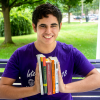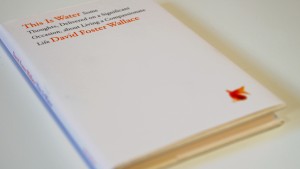The importance of this story embodies liberal arts education: not teaching you how to think, but teaching you the importance of choosing what to think about. Since then, I have listened to a recording of David Foster Wallace’s speech every semester. Choosing what to think requires an incredible amount of concentration and focus that a liberal arts education is supposed to teach you. The cultivation of a holistic sense of self complements the pursuit of music and fine arts, with economic theory, programming, and psychology. Throughout these semesters, the question he poses in the parable is still unanswered, but his lesson on what to think about seems more present than ever. Every day I wonder: is this water?
Testing the Water
I arrived at Kenyon for my first semester with a clear determination and purpose behind what I thought I would pursue for the next four years and, subsequently, the rest of my life. Political science, I thought, was the discipline that encapsulated all the wonders of justice, freedom, and equality that I yearned for in Venezuela. In the political science class Quest for Justice, I read texts from classical and modern authors that reflect upon the very basis of Western political philosophy and society. Though the class ends with a compilation of reflections of justice, the class (spoiler alert) teaches you that there is no single answer to what justice means. Instead, there are different pursuits and branches of political thought that can help you make sense of what abstract concepts of justice and equality mean and pursue your own quest for a fairer world.
Finding the Words
As time went on, I decided that studying political science would not give as much of a global and interdisciplinary perspective as I was looking for. I switched my major to international studies and spent the summer working at the Venezuelan Interim Government’s Embassy in the United States. I questioned experts in Congress, conducted research impacted by my learnings in classes, and realized the importance of pursuing an even more global education.
At the beginning of my sophomore year, I walked into Ascension Hall and was greeted by a professor in a language I had only heard a couple of times: Mandarin. I decided to study Chinese and began a minor that I have taken classes for ever since. Every morning I woke up and learned the vocabulary for the day before class. When I first joined the class everyone else around me had taken Chinese in high school, but by the end of the first semester I found myself catching up. By simply learning to communicate differently, I started understanding new notions of language and observing the world in a new way. Chinese made me lose the fear of not knowing.
Cultivating Radical Empathy
The following semester, I gathered a few friends on a Thursday night to discuss the challenges of the Venezuelan crisis and other humanitarian crises around the world. I founded Yakera, a crowdfunding platform that creates an opportunity for people in Venezuela to tell their own stories, make their own campaigns, and receive 100% of the donations in an e-wallet to pay for goods and services directly. At that moment, I did not know what a user journey was, or what tech stack and what kinds of developers we needed in the team. But I had enthusiasm and drive. Creating a company from scratch meant that I needed exactly what David Foster Wallace argues the liberal arts education emphasizes: a radical sense of empathy.
Starting Yakera was a journey in itself, but I found it shaping my interests outside the startup. I decided to take a class called Programming Humanity, where I found myself immersed in conversations about the very basis of technological innovation, developing research projects to grasp a greater understanding of the humanities and social sciences through applied analyses in ways that I had not learned in any other class. Going from a purely source-based essay that compared and contrasted several viewpoints of the Venezuelan crisis, I was able to extract almost 400,000 tweets and perform sentiment analysis using AI to observe how different groups of political leaders changed their position towards the Interim Government over time.
Looking Forward
During my time at Kenyon, I have shifted interests, careers, and even my outlook in life. My education here has challenged beliefs that I still have and others that I’ve left behind. More than anything, it’s provided me with a way to make sense of the world and a mindset in which each experience, as unconnected as it seems, can prepare you for the next big endeavor. Exploring the true meaning of justice, philosophizing, speaking a foreign language, programming, and engaging in meaningful discussions are all individual paths or part of the same path one can choose to pursue here. The true value of our education is not inherently about the specific courses you take, but rather what Wallace calls the freedom of being well-adjusted. Time goes by. Leaves fall. Careers might change. The true impact and importance of the liberal arts education throughout time lies in the decision to escape from our inherent self-centeredness, to challenge our beliefs, and to “consciously decide what has meaning,” to quote This is Water.

